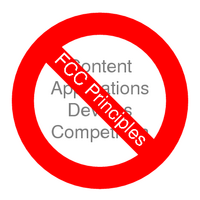A huge number of comments have been received already, by Jan 15 deadline. More comments are solicited. See also openinternet.gov.
The general idea is to take six proposed principles and turn them into rules that are enforceable and not unreasonable:
The first four principles have been around for several years. The last two, nondiscrimination and transparency, are the same as the ones Scott Bradner’s petition recommended back in June 2009. Back then I mentioned as I always do that the FCC could also stop talking about consumers and talk about participants. Interestingly, their slide at this talk did not use the word “consumer”, so maybe they’ve gotten to that point, too.Proposed Rules: 6 Principles
- Access to Content
- Access to Applications and Services
- Connect Devices to the Internet
- Access to Competition
- Nondiscrimination
- Transparency
The FCC is also making a distinction between broadband and Internet. There are existing rules regarding “managed” vs. “specialized services” for broadband Internet access, but for net neutrality in general, maybe different rules are needed. Continue reading

